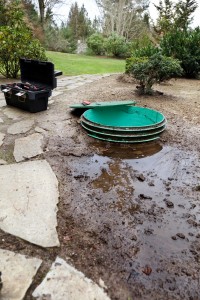02/22/2018
The septic system, drains, and grease trap all need routine maintenance. For instance, failing to have your septic tank pumped, means the tank could be filled with solids and sludge, which can cause big problems!
The Most Common Septic System Emergencies Include
Toilets Overflowing
When the septic tank isn’t routinely pumped out, solids and sludge are allowed to build-up until it fills the tank. At this point wastewater entering the tank doesn’t have anywhere to go, therefore it backs-ups into the bathtub and overflowing toilets.
 You Find Wastewater in the Yard
You Find Wastewater in the Yard
The drain field is a series of pipes, gravel, and dirt. Designed to filter and safely remove the wastewater back into the ground. If you are experiencing pooling water in your yard and it hasn’t been raining, it may be your drain field failing.The pipes may be clogged with waste particles, causing wastewater to rise to the surface.
Slow Drains and Back-ups
If you notice the kitchen sink or bathtub is draining slower than usual, it may be more than just inconvenient. Other signs include a gurgling toilet, wastewater or sewage backing up into the bathtub or drains.
Foul Odors
All the household water from the dishwasher, kitchen sink, toilets, washing machine, baths and showers, goes into the septic tank. If the septic tank isn’t pumped out regularly, it can start to emanate strong pungent odors. They can usually be detected from the kitchen sink or bathroom or outside around the drain field.
Your septic system is a big investment, make sure you take care of it.
We are committed to providing the very best quality and customer service. Orlando Septic Service is an environmentally friendly company serving Central Florida for 23 years. We are a licensed septic contractor certified with the State of Florida.
Unfortunately, septic systems don’t last forever. But with routine maintenance their life can be extended. Typically, they need to be replaced every 15 to 20 years.


